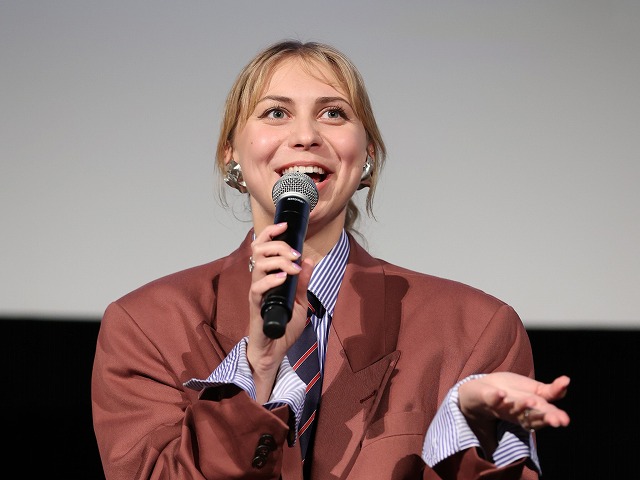
Many of the films at the 37th Tokyo International Film Festival tell stories about migrants, which has become an issue worldwide as people move to where there is work and opportunity even at the risk of their own lives. The Slovakian film, Promise, I’ll Be Fine, playing in TIFF’s Competition section, takes a different approach to this issue by focusing on a mountain village where the impoverished residents are sticking it out. First-time director Katarína Gramatová, appearing for a post-screening Q&A session on November 3, explained why.
“In Slovakia, these places are called ‘hungry valleys,’” she said. “These villages used to have factories, but after they were privatized, most of the people lost their jobs. However, they are very patriotic and decided not to move to other places to work. When we were in this one village, we heard stories in the pub that many old people from western Slovakia had suddenly moved into the village, and that gave us the idea for the movie.”
Structured as a classic coming-of-age tale, Promise, I’ll Be Fine is centered on 15-year-old Eňo (Michael Zachenský), who is living with his grandmother (Jana Ol’hová) in the village while his single mother (Eva Mores) is supposedly working for a real estate company in Austria. Eňolives for his mother’s occasional visits and worships the ground she walks on, until rumors start finding their way to him claiming that she is involved in a scam that exploits older Slovaks who are in debt. The news greatly disturbs Eňo, who, as it happens, hangs out with a group of boys who themselves live on the edge of the law, dealing in petty theft and riding their mopeds at high speeds through the mountain trails.
The audience was quite interested in the mechanics of the mother’s alleged crimes, since the movie doesn’t take a stand as to whether what she is doing is legitimate or not. But the dramatic dynamic holds that in such a village, gossips are going to gossip. Since she shows up occasionally in her new Saab and seems fairly well off, his mother must have come to those rewards improperly, say the gossips, and Eňofeels caught in the middle.
“The perspective of the mother was important to me,” said Gramatová. “I don’t necessarily think that what she was doing is wrong. She was not prepared to be a mother and was doing her best to provide for herself and her son. Her own mother was also a single mother. At the same time, I had to think about the feelings of the child, who thinks he is unwanted. The movie shows how he comes to understand the difference between right and wrong in order to become a man, even if he may be judging his mother too harshly.”
After explaining this “business model” in more detail for the audience’s edification, the producer and story originator, Igor Engler, clarified that the mother “just finds someone in debt and then buys their house. They move into an apartment that’s 100 times cheaper and she sells the house for a big profit.” As to whether this practice is unethical, neither he nor the director wanted to make a definite pronouncement.
One viewer wanted to know about the budding juvenile delinquents and how they were cast. Engler said that they were four boys from the village where they shot the film and had never acted before. “We found them building their mopeds, and Katarína had to visit often to get them used to being in front of a camera.”
The cinematographer, Tomáš Kotas, who arrived halfway through the Q&A because he got caught up in a TIFF event celebrating Godzilla’s birthday, added that they had shot a teaser for the film with the four boys and after that they had seemed acclimated to the film set. “Katarína was able to keep them going,” he said. “The movie required a lot of energy on their part, and they were amazing for the 30 days we shot the film. They bent reality to the images we wanted.”
Producer Julie Marková Žáčková said that when Gramatová approached her with the idea for the movie, “She had these beautiful photos of the boys, and I knew immediately that it was going to work out. Katarína is originally an editor, and I knew her from the Slovakian and Czech film community. Editors always make the best directors because they know where to cut. She spent a lot of time in the village to get those boys to give their hearts and souls to the film.”
TIFF moderator Yasuda Yuko commented that the final scene in the movie, which is an extended closeup of Eňo’s eyes as he rides his moped after an emotional confrontation with his mother, moved her to her core, and Gramatová admitted that, in fact, when she started writing the script this was the first image that came into her head. “I had to prepare the actor for this closeup, because it needed to be strong so that the audience could feel the power of his emotions.”
One audience member commented that the ending reminded him of the ending to the movie, Call Me by Your Name, where the camera also lingers uncomfortably long on Timothée Chalamet’s emotional expression. Engler agreed. “Michael Zachenský is the next Timothée Chalamet,” he said.
Q&A Session: Competition
Promise, I’ll Be Fine
Guests: Katarina Gramatová (Director/Screenplay/Editor/Original Story), Igor Engler (Producer/Original Story), Julie Marková Žáčková (Producer), Tomáš Kotas (Director of Photography)


























































